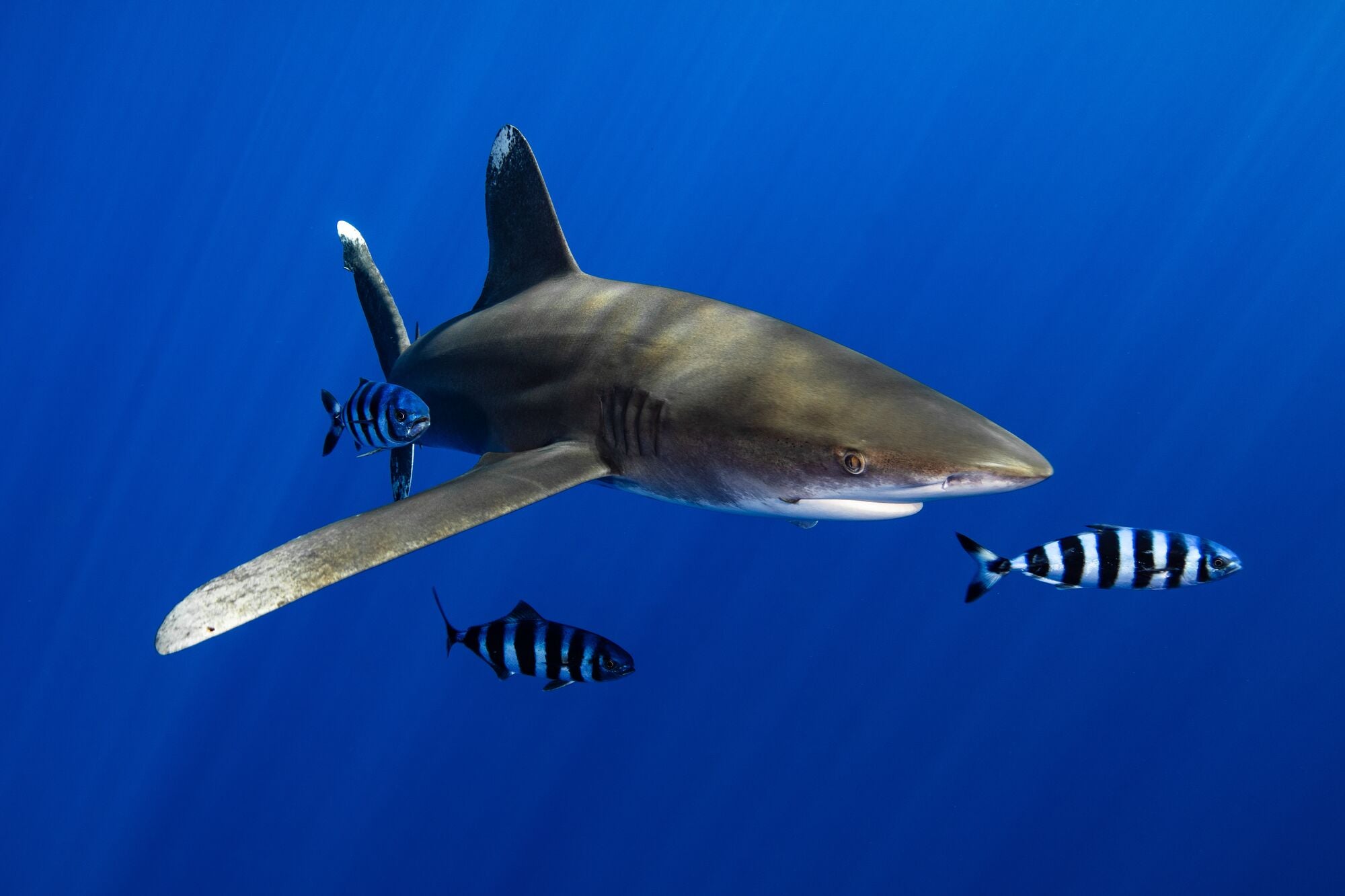Congressmen Want to Investigate Sharks For Eating Fish
No, this is not a satirical headline from The Onion.
Four Congressional lawmakers are pushing legislation to try to stop sharks from eating fish. Yes, you read that right.
They want a new federal task force formed to delve into why sharks eat fish — but not just any fish. Their ire is for sharks that eat fish that humans are trying to catch — with many of these humans doing it for sport in big-bucks fishing tournaments.
When a shark bites the fish on someone’s line, that’s “the tax collector taking more off the top,” U.S. Rep Garret Graves of Louisiana claimed in a news release.
No mention that humans who are fishing are actually in the sharks’ house, arriving uninvited and repeatedly raiding the fridge.
U.S. Reps. Graves, Rob Wittman of Virginia, Darren Soto of Florida, and Marc Veasey of Texas claim that their SHARKED Act would help sharks by “protecting sharks from unsafe conditions” and improving “sportfishing conditions for anglers.” The SHARKED Act also uses language that might confuse the casual reader that it’s somehow about marine conservation. It’s not. (The bill’s long, tortured title is a prime example — SHARKED stands for “Supporting the Health of Aquatic systems through Research, Knowledge and Enhanced Dialogue Act).
It’s irresponsible to direct marine experts and regulators to step in to act as some sort of referee between anglers and sharks. America’s fisheries agencies are understaffed, underfunded, and overwhelmed. They don’t have the money or resources to caretake all the dwindling marine species that we know need help — many of them creatures on the brink of extinction. Ocean biodiversity is in crisis worldwide, and we don’t have time for nonsense.
Sure, it’s disappointing when somebody catches a big fish and a shark chomps it before they can reel it in. But that’s nature. Isn’t the whole point of being out on the water to enjoy its raw beauty and untamed wildness? Does it need to be said that the ocean isn’t just for humans?
Sharks should be a priority for conservation because they are apex predators and without them, the whole ecosystem unravels. The sad fact is that oceanic sharks and rays have declined by 71% since 1970, mainly because of overfishing. The SHARKED Act is a slippery slope towards killing more sharks, and it argues for doing so because sharks eat fish, and some sport fishermen are mad about it.
In a July legislative hearing, Rep. Bentz of Oregon asked a witness if we should reduce shark populations if the Task Force shows an increase in sharks. The witness said yes. This followed rhetoric about an “inescapable biomass of sharks” and a celebration from Alabama Rep. Carl of the 1,019 pound tiger shark killed in the 90th Annual Alabama Deep Sea Fishing Rodeo last month. All of this while global shark populations struggle, prey species continue to be overfished, and marine life nurseries, including coral reefs and seagrasses, die from climate change and pollution.
Sharks aren’t always hunted outright — many are killed unintentionally as “bycatch” by longline fishing fleets that target other species, including tuna and swordfish. The boats drag hook-filled lines stretching as long as 50 miles. Once caught, a shark may struggle for hours and die. Even if it is hauled up to the boat and released alive, it may die later from stress, infection, or injury.
Instead of focusing on the real issues at hand or enforcing federal and international laws that protect threatened and endangered sharks, America holds blood-sport shark-killing fishing tourneys — and lax regulation supports it. A detailed investigation by The Nation called The Great American Shark Slaughter found that the National Oceanic and Atmospheric Administration’s regulatory mechanisms “remain captured by the fishing industry, and, in fact, the agency is considering proposals to strip shark protections even further. Meanwhile, journalists and investigators on the docks report widespread patterns of poaching and other crimes against wildlife at NOAA-sanctioned shark-killing contests.”
To prove how lax NOAA’s regulations on protecting sharks are, the reporter and a friend registered a fake shark tournament called the Roberts Roundup and “were approved to oversee the killing of critically endangered scalloped hammerheads. The process required submitting a brief web form and waiting two days.”
But not everyone treats sharks so poorly. Sharks have a vital role in the spiritual lives of many communities. Some Native Hawaiians have a special relationship with the shark (manō) as a family ‘aumakua — a deified ancestor that protects and warns against danger. Native Hawaiian cultural practitioners may honor their ‘aumakua by acting as shark guardians (kahu manō) and defending these sacred animals from death due to inhumane fishing practices. More broadly, this plays into an understanding that we cannot separate ourselves from nature.
We need to respect our marine life. Sharks have traversed the ocean for over 450 million years — eating fish — in their habitat. We have no right to stop that. Targeting sharks for blood sport killing or condemning these ocean predators for eating fish is short sighted and will lead to fewer sharks and fewer fish. And so will the SHARKED Act.
Established in 1989, Earthjustice's Policy & Legislation team works with champions in Congress to craft legislation that supports and extends our legal gains.
Geoffrey Nolan
Public Affairs and Communications Officer, Earthjustice
gnolan@earthjustice.org
